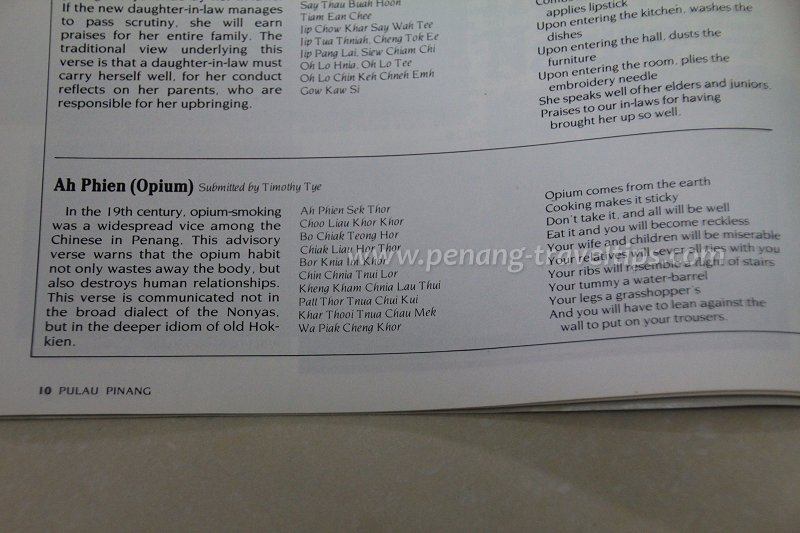
A3phien3 (鴉片), Penang Hokkien Ditty
 Go Back | PENANG Sights & Streets | Hokkien | Dictionary | Real Estate | SojiMart | Facebook | Contact Me | About Me
Go Back | PENANG Sights & Streets | Hokkien | Dictionary | Real Estate | SojiMart | Facebook | Contact Me | About MeA3phien3 [a-phiɛn] is a Hokkien rhyme about opium. Written in the early 20th century, it served as a public service announcement to the Hokkien community to stay away from the drug. The A3phien3 poem offers a glimpse into a period of time when opium taking was a menace to society. It warns of the dangers for becoming addicted to opium and talks of the resulting circumstances.
This poem was first recited to me by my elderly nanny when I was small. My nanny was born in the late 19th century, and lived through both world wars. I managed to remember it long enough to have it transcribed and published in the Pulau Pinang magazine in 1990.
Recently I discovered that Raymond Kwok has also included it in his book of Hokkien rhymes and Ditties. In fact, it is the first poem in the book.
I am re-writing this poem now using Taiji Romanisation, and am sharing it with you below.
 A-phien (11 September, 2013)
A-phien (11 September, 2013)
A3phien3 sek3 thor2,
Cu4 liau4 kor3-kor2;
Boh3 ciak1 teong3hor3,
Ciak3 liau4 hor3tor2.
The opium comes out of the ground,
Once cooked, it becomes gooey,
It's good not to consume it,
Once taken it will destroy you.
Bor1knia3 mm33 kor3,
Chin3cnia2 tnui3 lor33
You will abandon your family,
Relationships will be severed.
Heng3kham4 chnia3 lau3thui1;
Por1tor4 tniau3 chooi1kooi3;
Kha3thooi4 tniau3 chau1mek3;
ua1 piak3 cheng3 khor3
Your ribs resembles a flight of stairs,
Your belly like a water barrel,
Your thighs like the grasshopper's,
You'd be leaning on the wall to put on your pants.
The following version, contributed by Ng Chee Lam, is in Chinese and Taiwanese Romanization.
鴉片生佇土 a-phiàn senn tī thóo
煮了糊糊 tsú liáu kôo-kôo
無食上好 bô tsia̍h siōng hó
食了糊塗 tsia̍h liáu hôo-tôo
某囝毋顧 bóo-kiánn m̄ kòo
親情断路 tshin-tsiânn tuī-lo̍h
胸坎仝樓梯 hing-khám siāng lâu-thui
腹肚大水櫃 pak-tóo tuā tsuí-kuī
跤腿大草蜢 kha-thuí tuā tsháu-meh
倚壁穿褲.. uá-piah tshīng khòo
Vocabulary
a3phien3 [a-phiɛn]: (noun) opiumchau1mek3 [tshau-mɛk]: (noun) grasshopper, 蚱蜢
chin3cnia2 [tshin-tsiã]: (noun) relations, relationships, relatives
chnia3 [tshia]: (verb) to resemble (像, colloquial reading?)
chooi1kooi3 [tsui-kui]: (noun) water tank heng3kham4 [heŋ-kham]: (noun) chest
hor3tor2 [hɔ-thɔ]: (adjective) muddled
kha3thooi4 [kha-thui]: (noun) thigh
khor3 [khɔ]: (noun) pants, trousers
kor3 [kɔ]: (verb) to look after
kor3-kor2 [kɔ-kɔ]: (adjective) gooey
mm33 kor3 [m-kɔ]: (verb) to neglect, to abandon
teong3hor3 [tiɔŋ-hɔ]: (adjective) faithful, sincere
tniau3 [tsiãu]: (verb) to look like (張, colloquial reading?)

Copyright © 2003-2025 Timothy Tye. All Rights Reserved.